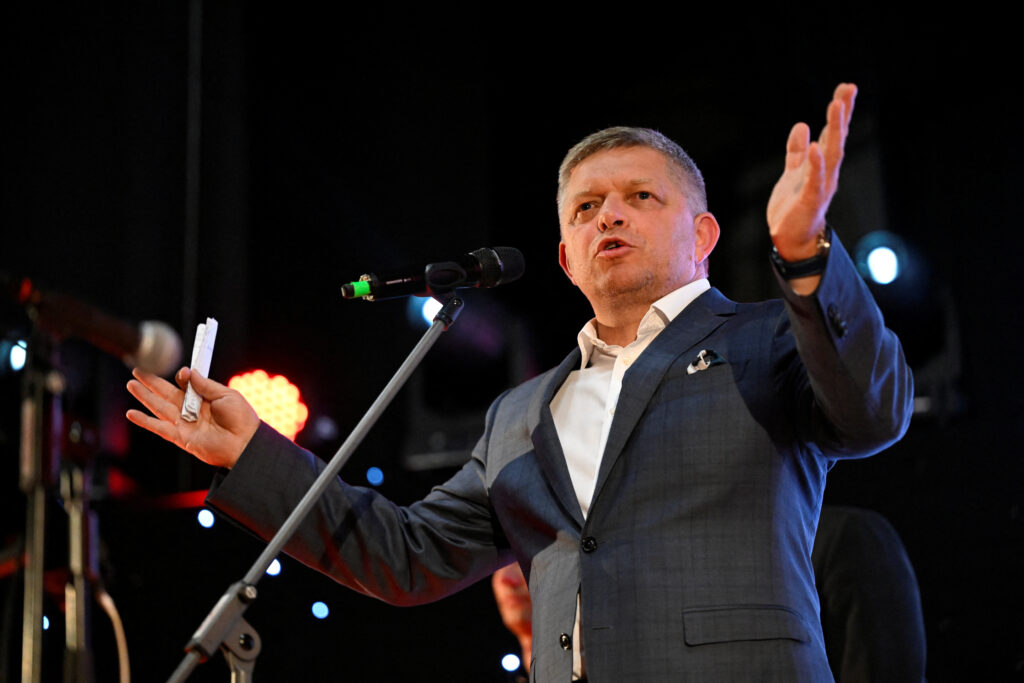
- Despite Fico’s electoral victory, complexities in the political landscape indicate that significant shifts in foreign policy, especially in its approach to the Russia-Ukraine war, may not be on the horizon.
- Fico’s major challenges are the lack of a parliamentary majority, Slovakia’s economic challenges, and the resonance of the Ukrainian issue with the Slovak population.
- His campaign promise of “no bullets to Ukraine” aligns with the reality that Slovakia has already reached its capacity to provide further assistance.
Slovakia recently conducted parliamentary elections that culminated in the victory of former Prime Minister Robert Fico and his Smer (Direction) party. Despite securing nearly 23 per cent of the vote, Smer must establish a coalition government. President Zuzana Čaputová has assigned Fico the task of leading the government formation process.
Fico’s election campaign revolved around his stance on the Ukraine conflict, advocating for discontinuing arms shipments to Ukraine and lifting sanctions against Russia. He emphasized his commitment to cease providing “any more shells” to Ukraine and urged early peace negotiations.
The success of Fico can be attributed to the widespread opposition to the Ukraine war among the Slovak population. Polls indicated that a majority of Slovaks held the West and Ukraine responsible for the war, with consequences exacerbating the social situation, particularly for pensioners.
Robert Fico, a 59-year-old former Prime Minister of Slovakia, has garnered various labels, such as “Slovakia’s Orban.” Some have characterized him as a Putinist or communist, though he identifies as a Social Democrat. His previous tenure from 2006 to 2010 and from 2012 to 2018 was marked by mass protests linked to the murder of investigative journalist Jan Kuciak, who was investigating corruption tied to the ruling party. Liberal forces, which gained momentum following Kuciak’s murder, have faced criticism for their positions on the Ukraine conflict, the European Union, and market-oriented social policies.
In the recent election, the Progressive Slovakia (PS) party, led by European Parliament Vice President Michal Simecka, secured second place with 18 per cent. PS advocates neoliberal economic policies and a tough stance on Russia. Igor Matovič’s Olano party, initially elected on an anti-corruption platform in 2020, allied with two right-wing micro-parties but only received 9 per cent. Matovič’s coalition experienced internal conflicts and supported the Ukraine war.
Potential government partners for Fico’s coalition include Peter Pellegrini’s Hlas (Voice) party, the Slovak National Party (SNS), and the Christian Democrats (KDH). Pellegrini’s party, a breakaway from Fico’s Smer, is open to cooperation.
Fico’s election victory has raised concerns in Brussels and Berlin due to fears that Slovakia may resist supporting Ukraine and maintaining sanctions against Russia. However, Slovakia’s economic dependence on the EU is expected to prevent extreme opposition.
Fico, often referred to as a “Stalinist turncoat,” has embraced right-wing policies while employing populist rhetoric. He founded the Smer-SD party in 1999 and has shifted it further to the right over the years. His past alliances with far-right parties and willingness to engage with right-wing extremist forces have raised questions about his future government’s direction.
While Fico’s anti-Ukraine war stance has garnered popular support, it may have limited practical consequences since Slovakia has already provided military aid to Ukraine. Moreover, potential coalition partners like Pellegrini support military aid, suggesting differing positions within the future government.
Despite Fico’s electoral victory, complexities in the political landscape indicate that significant shifts in foreign policy may not be on the horizon. These complexities include Fico’s party’s lack of a parliamentary majority, Slovakia’s economic challenges, and Fico’s awareness of the Ukrainian issue’s resonance with the Slovak population. His campaign promise of “no bullets to Ukraine” aligns with the reality that Slovakia has already reached its capacity to provide further assistance. In contemporary politics, interests often outweigh ideologies, as demonstrated by leaders like PM Meloni and others.
In conclusion, Slovakia and Eastern Europe are entering an intriguing phase with Fico’s return to power. Still, it’s essential to consider the intricate dynamics that could influence the course of its foreign policy, especially concerning Ukraine.
(The author is a post-graduate student in International Relations at Kalinga University, Raipur. Views and opinions expressed are the author’s own)
Aayush Pal is a freelance writer on contemporary geopolitical developments. The views expressed in his work are entirely his own.
